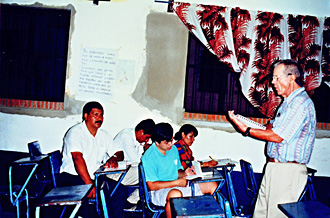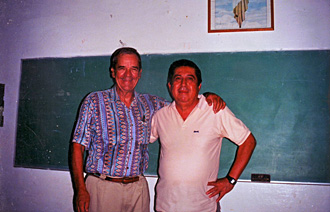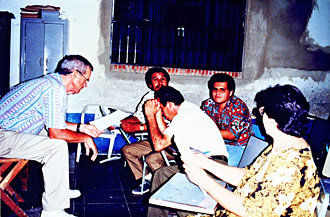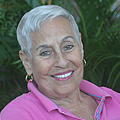 |
 |
 |
 Tales of Retirement in Paradise Tales of Retirement in Paradise  
Chapter 23: Cast Your Bread Upon the Waters...
 Polly G. Vicars Polly G. Vicars


| | In the Fall of 1994, we began as helpers to Maestro Abelardo. Husband and I split up to help students with correct pronunciation. | 
| | Husband and Abelardo Robles Herrera, who began teaching English to his contemporaries in the 1950's. | 
| | Husband and his students - taxi drivers, store clerks, construction workers, homemakers, fishermen, office workers. |  |
Although Husband and I didn't discover this honest-to-goodness paradise, Puerto Vallarta, until 1988, other brighter gringos made the discovery in the late forties and early fifties. Californians Fredericka Sylvia Holt and her husband Harry were two of them. The gentle, warm people of Vallarta so enchanted Fredericka that she wanted to give something in return for the enriched life she was experiencing in Vallarta. (Have you noticed that this place seems to bring out the best in us?)

What did she have to give? She had a great love for mankind, a courageous heart and a deep reservoir of knowledge which she could share. (She, like this writer and AMF President Bernice, was a former teacher.) Hardly anyone in Vallarta spoke English at that time. Fredericka, who in her wildest dreams could not have imagined the tourist destination Vallarta would become by 1995, did realize that it was inevitable that more and more gringos would discover this tropical paradise. She correctly perceived that English would become a very important language to the Vallartenses.

Accordingly, she determined she would start a school to teach English to anyone who had the desire to learn. She convinced the city fathers to furnish classrooms in the primary school, viente de noviembre. (November 20th marks the beginning of the 1910 Mexican Revolution against the oppressive military dictator Porfirio Diaz. All over México, streets, schools and buildings are named for this important date.)

So this extraordinary woman began a free night school for anyone who had the desire to learn English. The word spread, and soon Fredericka had a classroom full of eager students. She had taken on a major challenge. She spoke little Spanish and, of course, her students spoke no English. But she knew one universal language - music. So don't be surprised if at a gathering of some of Vallarta's most prominent citizens, you suddenly hear a group break out in "Home on the Range" or "Sweet Adeline," as each of her students learned these and many other American standards from Fredericka.

At a recent meeting of the AMF, I was chatting with prominent social, business and community leaders Lupita Covarrubias and Aurea Torres de Applegate. (Sadly, Aurea has passed on, but Lupita is very much alive and still singing!) When I asked them about the English school, they answered me with a rousing version of "Home on the Range" that would have made Fredericka, who is now, I am sure, teaching this same song to the angels, very proud. I came away with the feeling that the singing of this song is every bit as meaningful to a select group of Vallartenses, as the singing of the Whiffenpoof Song by Yale men or the secret handshaking of the Masons.

Local tycoon Alejandro Meza, who recently opened the downtown modern department store Lans, not only was a student at viente de noviembre, but like so many alumni of this extraordinary school, spent many years teaching others to speak the language that was becoming more and more important in this no longer "sleepy little village."

But the leader of this pack of viente de noviembre alumni is Abelardo Robles Herrera. Abelardo was one of Fredericka's first students. He studied (and sang) with her for two years, and during those two years, his incredible talent for language shone through brightly. When the third year began, Fredericka was so inundated with students that she had to enlist her husband and her brightest student - Abelardo. So in the 1950's, he began teaching English to his contemporaries.

Now in the 1990's, viente de noviembre is under the direction of Maestro Abelardo. "Now under the direction" may indicate to you a recent change, but that is not the case. Unfortunately, many years ago Fredericka became ill and left Vallarta. Abelardo took over and has directed and taught at this free English school more than thirty years.

The classes, which are in session every Tuesday and Thursday night from 8 until 10 o'clock, still meet at the same school. Maestro Abelardo still uses Fredericka's methods and, incredibly, the same little textbook, "Ingles Elemental," which was first printed in 1937 in México City. With only a limited number of books, pages have been duplicated over and over and over again. (I'm sure the authors and the publishers would gladly overlook any copyright infringements considering the use of the copies.)

Neither Husband nor I are blessed with the ability to carry a tune, but we have acquired a sufficient knowledge of Spanish to communicate effectively with the locals. So when we heard of a need for English-speaking helpers at this school, we decided to take a look. The building was a beehive of activity with bright-eyed boys and girls, neatly dressed in their uniforms of blue and white, filling the classrooms.

We found one of the three classrooms allocated to English classes, and went in. We were captivated by the intense interest of the students, the mutual respect displayed between teachers and students, and the atmosphere of a true academic institution, not withstanding the physical appearance of the sparsely furnished classroom.

Maestro Abelardo explained that when students first come to enroll, they are issued copies of the first few pages of the textbook and subsequently more pages are given as needed. When a student has proven his dedication to learning English, then a whole book may be copied and bound (at the teacher's expense I suspect.) To have a whole book is to have a coveted object of value.

When questioned about why they come two nights a week, week after week, month after month, and year after year, the students' answers are remarkably similar. Of course, they realize that their careers in this tourist destination will be enhanced if they speak English, but that does not appear to be the driving force. A love of learning, a thirst for knowledge, a striving for excellence appear to be their motivators!

One night's visit and we were hooked! Husband and I knew we wanted to be a part of this school. So in the Fall of 1994, we began as helpers to Maestro Abelardo, who is a prominent auto parts dealer by day and a volunteer teacher and Director by night. Many Vallartenses and gringos have helped through the years. For the last ten years, Maestro Nacho has been a dedicated teacher and the Manager of the Package Department of the local Post Office. Maestro Roberto, an electrician and plumber, has been teaching for the past four years. All learned their excellent English at this school.

There are four levels of instruction, each class lasting for one hour. The first three years of instruction are strongly grounded in grammar. The fourth year class is mostly conversation and honing of the skills previously learned. Husband and I split up to help in different levels with correct pronunciation (Can you imagine this Florida Cracker and Kentucky Hillbilly Husband teaching these fine Mexicans to say "Mornin'! How ya'll?")

I am what is known as a "day person." I wake up eager to take on the world! The early morning hours are when I do my best work. As the day wears on, I wear down, and by 9 o'clock, I am ready for bed. But, somehow these classes change all that; they re-vitalize me. When I walk into the classroom and am greeted with the customary hugs, handshakes, and smiles, my juices begin to flow, and I could teach all night.

How can I explain these students? They range in age from fifteen to fifty. They are both men and women. They are taxi drivers, store clerks, construction workers, homemakers, fishermen, office workers. They are respectful, attentive, serious. They are warm, sensitive, giving, compassionate. They make my heart sing, and my face smile.

I loved my sixth graders back in Kentucky all those years ago; but unexplainably, it is a somewhat more powerful love that I feel for these remarkable Mexican adults whose thirsts I try to quench in that austere classroom where all material objects (I have to conserve my chalk as you would your capital) are scarce, and all the things that really matter are abundant.

The room, while not brightly lit and with the ceiling fans sometimes working and sometimes not, is so filled with love flowing to and fro among us that it lifts you up like the increased air pressure flowing beneath the wings of a speeding airplane. We, both students and teachers, are constantly amazed when it is time for the class to end. Often, after the last class when no one is waiting for the classroom, we work well beyond the closing time of 10 o'clock.

In the first class after the Christmas vacation, I thought it would be fun to hear about their Christmases. I was entertained with colorful stories of great family get-togethers - grandparents, uncles, aunts, cousins, sisters, brothers, nieces and nephews - preparing fiestas of traditional Mexican foods. They told of constructing colorful and fanciful piñatas filled with candies for the children and then the wonderful fun they had watching the blindfolded little ones swinging the big stick trying to burst the piñata to get at the spilled contents.

They told of posadas where they reenact Joseph and Mary looking for the inn on Christmas Eve. There is a burro for Mary to ride; the rest, dressed in white and carrying lighted candles, follow behind Mary and Joseph as they go around the neighborhood looking for a place to stay. When they finally reach the planned site of the party, the burro and all go in for a celebration that may go on all night.

I loved their stories. But what really struck me was that no one even mentioned gifts. Even though I am sure some did receive presents, that was not the highlight of their Christmas. The family, the tradition and yes, even the spiritual, were what was important! How different from my Christmas, and, I suspect, yours!

We wound up the year with mixed emotions - feelings of satisfaction with our accomplishments and feelings of sadness at leaving the students. Even though we looked forward to our summer activities, we knew we would miss them and Director Abelardo. But - no problema, we'll all be together again come Fall.

(In 2005 Maestro Abelardo decided the time had come for him to retire and the Holt school retired with him. But we saw Abelardo only last week and he said he cannot walk down the street without the joy of seeing someone who had been in one of his classes. Husband and I, although our stint only lasted eight years and ended when we took our 4 month around the world cruise in 2000, have the same wonderful experiences of seeing former students wherever we go.)
 Polly G. Vicars and her husband of 57 years, Hubert (a.k.a. "Husband") retired to Puerto Vallarta in 1988 and soon became active members of several charitable organizations. Polly is the author of "Tales of Retirement in Paradise: Life in Puerto Vallarta, Mexico" [a sell-out!] and "More Tales of Retirement in Puerto Vallarta and Around the World." Proceeds from the sale of her books go to the America-Mexico Foundation, a scholarship foundation that is their passion. Polly G. Vicars and her husband of 57 years, Hubert (a.k.a. "Husband") retired to Puerto Vallarta in 1988 and soon became active members of several charitable organizations. Polly is the author of "Tales of Retirement in Paradise: Life in Puerto Vallarta, Mexico" [a sell-out!] and "More Tales of Retirement in Puerto Vallarta and Around the World." Proceeds from the sale of her books go to the America-Mexico Foundation, a scholarship foundation that is their passion.

Click HERE for more articles by Polly Vicars. | 
 | |
 |



